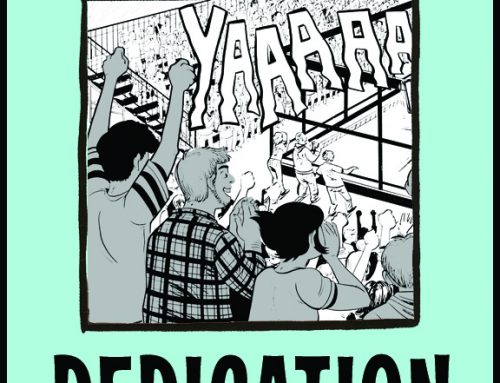test heading
(from the George Eastman House. We try not to keep this much money in the office — and mostly we don’t put it through a shredder when it is around!)
Should you ask your publisher for money?
Let me first say that I’m talking about this in a marketing context, not a publishing one. We do believe in authors getting paid when publishers publish their books! When we buy books from authors, there is always money involved. Authors are not paid in comp copies, in shells, or in beads (at least by First Second).
So, should you ask your publisher for money to help you market your book?
Not usually, but sometimes.
There are many things that you could want money from your publisher to help pay for — promotional items (bookmarks, postcards, advance books, erasers, t-shirts, tote bags, prints, giant balloons), book tour expenses for a tour you’re setting up yourself (travel and hotels and meals), money to defray costs on online promotion (hiring a designer to set up a book-specific website, doing a trailer, hiring someone to set up a blog tour for you), money for advertising, and many, many more things!
Should you send an e-mail to your publisher with that list — ‘I want all of this!, give me many dollars and I shall make it happen!’?
That may not be the best way to approach this!
Publishers have budgets that are typically set by the beginning of the year. Typically by the time you’re thinking about promotional materials, they’ll already have a grid laying out exactly how much they can spend on your book (and all the rest of the books coming out that year) — and they’ll have a plan to spend that money in specific places.
So the most common response to the list of 10,000 things + giant balloons is, ‘no, that’s not what we have budgeted for this title.’
But sometimes, there will be some wiggle room in the title budget and your publisher will have some money to spare. If you really, really want marketing money for something you’re planning, what’s a good way to approach your publisher?
- Be aware of what your publisher is already doing.
Your publisher is probably planning to do some marketing for your book! Before you e-mail with a request, check in with your publisher about what they’re planning. Maybe you don’t need to ask for money for a book trailer because one is planned already, and your publisher can work with you to incorporate your video ideas into what they’re thinking.
Knowing what your publisher is planning also gives you a good perspective on what’s not being done. If you know that your publisher is planning extensive online promotion but not a blog tour (which you of course really want to do), you can now give them a reason why the blog tour you really want would be helpful and integrate with what they’re planning already.
Logic: it’s useful!
- Ask for limited (and special) things.
That 10,000 thing list? Probably not going to work! Publishers tend to have limited budgets for marketing. If you approach them wanting the sun, the moon, and the stars, they may not even give you an asteriod.
If you ask your publisher for money, make it a special case — probably you want the money for something that is going above and beyond anything that’s typical. You just got offered the keynote speaking slot on a conference on your book’s topic two weeks before your book’s pub date and you want to give out postcards to the attendees, who are exactly the book’s demographic — you got offered remnant ad space at a bargain price in a prestigious magazine that’s also running a pre-pub first serial excerpt of your book in that very issue — etc.
- Have a plan.
Everyone likes pins! I like pins myself. I always end up getting new ones at every show I end up at; I have a fabric wall at my desk that has pins from Kean Soo’s Jellaby, from our upcoming The Cute Girl Network, by Greg Means, MK Reed, and Joe Flood, a mysterious monster pin from who-knows-who, and a pin from Kazimir Strzepek’s The Mourning Star (which I feel there should be more of!). I would love to make pins for all of our authors, for every book. And if an author e-mails me to say, ‘I would really like pins,’ mostly what I say is, ‘I can’t give you money for that.’
What would convince me to say yes? If you have a plan. (And then I still need to find some money, so this is by no means a guaranteed strategy.)
Having pins because they are adorable is all well and good, but how are the pins going to help me (and you) sell your book? If you write an e-mail explaining that you’re going to be doing four pre-pub conventions where you’re going to be speaking, doing a slate of twenty school visits for your previous book in the month before your current book’s publication, and that you’re presenting on graphic novels to a hundred librarians before your book pubs and you need something to give all of those people so they remember to buy your new book when it comes out, that makes a great incentive for me to try to find the money.
Sales-related reasons are the best reasons! If you can tie your reasoning for wanting to do something to selling your book (as opposed to ‘because figurines would be adorable!’) that’s going to carry much more weight.
- Try bargaining.
Is your publisher planning to do something that you could do yourself, while there’s something that they’re not planning to do that you don’t have the skills to make happen?
If asking for the money straight out doesn’t work, try bargaining. If your publisher is planning a website that you could put together but not planning a trailer, ask if you could work on the website and then use the money they’d save on a trailer. If your publisher’s planning a tour to four cities and you’d like to go to five, volunteer to take care of travel or find your own accommodations in a few places to offset costs for them if they’ll set up the events in that last city.
This is not a strategy that always works, because sometimes budget lines are just not that easily translatable — and sometimes publishers may have reasons beyond ‘I don’t have the money to build a website!’ to have decided not to include that particular thing in their marketing plan. But sometimes, if money is the only object, this can be an effective strategy.
- Ask early.
Publishers tend to look at their budgets on a by-year basis. In January, publishers will have a lot of money; in December, they will have used most (if not all) of their budget until it becomes the next year, when they have a new budget.
This means that you’re more likely to be able to get money out of your publisher earlier in the year than later; if you ask in May, you’re more likely to get money than if you ask in November.
(This strategy also goes with #3, have a plan. The earlier you’re thinking about things, the more prepared you’ll be to market your book when it comes out!)
- Emergencies.
Say your publisher is sending you on a book tour; you volunteered to find your own accommodations when you’re in San Francisco, which’ll be great, because even though you don’t know very many people in the city, your best friend lives there and you’ll get to spend time with her. Huzzah! Everything’s all set.
But you talked to your best friend last night on the phone and she sounded a little strange, and now you’ve just gotten off your flight to San Francisco and your friend’s texted you to say that she’s just been to the doctor and she’s come down with chicken pox; there’s no way you can stay at her house. And the one other person you know in San Francisco isn’t picking up his phone when you called to see if you could maybe stay with him instead. Disaster!
Now is a good time to call your publisher and see if they can squeeze a little more money out of their budget and get you a hotel for the trip so you’re not sleeping on the streets. They will try their best to find the money.
And a final note.
Most of the time, when you e-mail a publisher to ask for money, the answer is going to be no. The publisher has a budget; they’ve already looked at all the books they’re publishing and allocated every book’s budget strategically where they think it’ll be used best to promote that book. Every time they have to reallocate money in a book’s budget, they’re taking it from some other thing they had planned for that book. Sometimes, this is good — ‘We spent $500.00 less on your tour than we thought, so we can use that money to do a book trailer!’ — but typically, there’s not a lot of wiggle room to do that sort of thing.
Obviously, we wish we had all the money in the world, so your book could have giant bouncy castles with your characters on the doors and a bus with your characters that travels all across the country with you in it. As we tend to only have some of the money in the world, what we do instead is to take that money and use it combined with our publishing/marketing experience to strategically reach all the best outlets for your book — booksellers and comic book sellers and librarians and teachers and readers.





